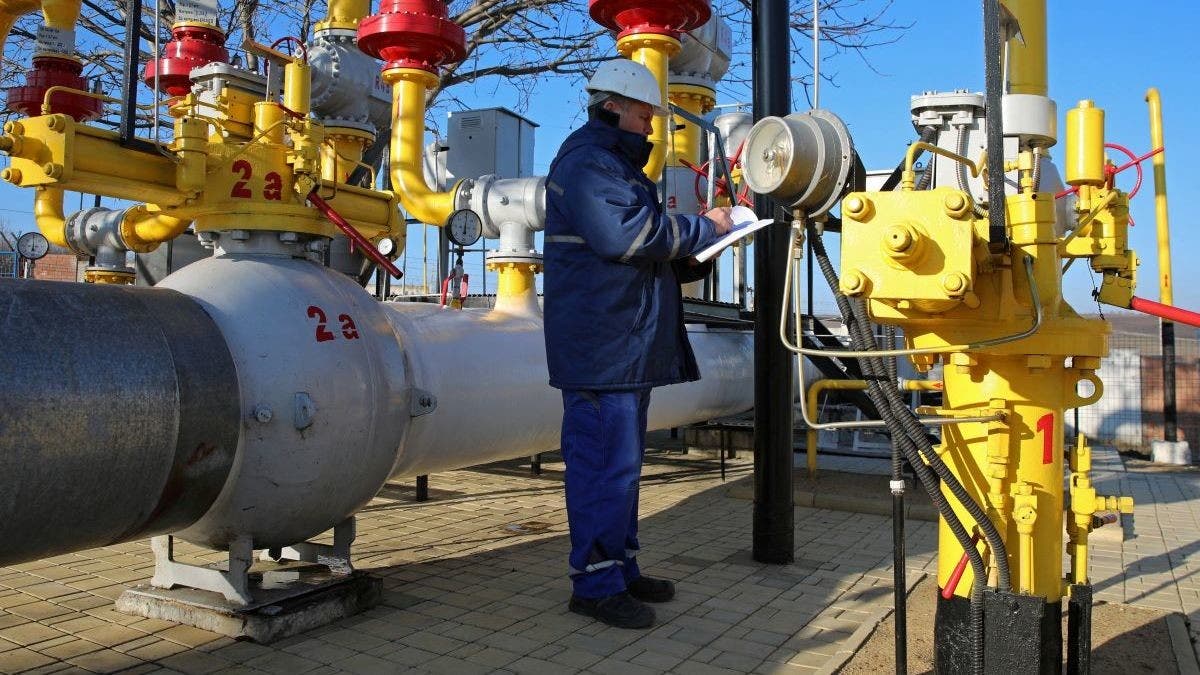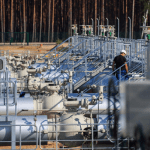Moldova’s Parliament has agreed to declare an emergency in the country’s energy sector, preparing for anticipated disruptions in natural gas supply from Russia this winter.
The resolution, which was agreed with overwhelming support in Moldova’s 101-seat legislature on Friday, will go into effect on December 16 and last 60 days.
The decision comes amid mounting concerns that Moscow may shut off gas supplies to Moldova, a European Union candidate with a population of 2.5 million, as part of a larger campaign to destabilize the area.
The state of emergency empowers the government to take immediate action to manage the risks posed by a potential energy crisis, particularly if Moscow fails to provide the natural gas required for Moldova’s largest power plant, the Kuciurgan facility, located in the breakaway, pro-Russian Transnistria region.
Prime Minister Dorin Recean called the situation as ‘extraordinary,’ warning that Russia could deliberately weaponize Moldova’s energy sources.
Such an action, he stressed, could leave Moldovans without heat or electricity during the harsh winter months.
Recean said “The risks are real, and the goal is to create panic and chaos.”
The Kuciurgan power plant, which is crucial for Moldova’s electricity supply, is powered by natural gas supplied by Russian energy giant Gazprom.
The plant was privatised in 2004 by authorities in Transnistria and later sold to a Russian state-owned company. Moldova does not recognize this privatization.
Moldova remains heavily reliant on Russian gas despite efforts in recent years to diversify its energy sources.
The energy vulnerabilities exposed by that crisis have made Moldova especially susceptible to Russian disruptions in gas supplies, particularly while winter temperatures drop.
The latest crisis comes at a time of heightened geopolitical tension in Eastern Europe.
Moldova, a former Soviet republic, has long been caught in the crosshairs of Russia’s efforts to maintain influence in the post-Soviet space.
Following Russia’s full-scale invasion of Ukraine in 2022, Moldova launched a concerted effort to minimize its reliance on Moscow and diversify its energy sources.
Romania, Moldova’s EU neighbor, has promised assistance in the case of a gas crisis. Sebastian Burduja, Romania’s energy minister, stated on Thursday that Romania is prepared to support Moldova if necessary, describing it as a duty in view of Russia’s continued aggressiveness.
Moldova’s Parliament has agreed to declare an emergency in the country’s energy sector, preparing for anticipated disruptions in natural gas supply from Russia this winter.
The resolution, which was agreed with overwhelming support in Moldova’s 101-seat legislature on Friday, will go into effect on December 16 and last 60 days.
The decision comes amid mounting concerns that Moscow may shut off gas supplies to Moldova, a European Union candidate with a population of 2.5 million, as part of a larger campaign to destabilize the area.
The state of emergency empowers the government to take immediate action to manage the risks posed by a potential energy crisis, particularly if Moscow fails to provide the natural gas required for Moldova’s largest power plant, the Kuciurgan facility, located in the breakaway, pro-Russian Transnistria region.
Prime Minister Dorin Recean called the situation as ‘extraordinary,’ warning that Russia could deliberately weaponize Moldova’s energy sources.
Such an action, he stressed, could leave Moldovans without heat or electricity during the harsh winter months.
Recean said “The risks are real, and the goal is to create panic and chaos.”
The Kuciurgan power plant, which is crucial for Moldova’s electricity supply, is powered by natural gas supplied by Russian energy giant Gazprom.
The plant was privatised in 2004 by authorities in Transnistria and later sold to a Russian state-owned company. Moldova does not recognize this privatization.
Moldova remains heavily reliant on Russian gas despite efforts in recent years to diversify its energy sources.
The energy vulnerabilities exposed by that crisis have made Moldova especially susceptible to Russian disruptions in gas supplies, particularly while winter temperatures drop.
The latest crisis comes at a time of heightened geopolitical tension in Eastern Europe.
Moldova, a former Soviet republic, has long been caught in the crosshairs of Russia’s efforts to maintain influence in the post-Soviet space.
Following Russia’s full-scale invasion of Ukraine in 2022, Moldova launched a concerted effort to minimize its reliance on Moscow and diversify its energy sources.
Romania, Moldova’s EU neighbor, has promised assistance in the case of a gas crisis. Sebastian Burduja, Romania’s energy minister, stated on Thursday that Romania is prepared to support Moldova if necessary, describing it as a duty in view of Russia’s continued aggressiveness.
Moldova’s Parliament has agreed to declare an emergency in the country’s energy sector, preparing for anticipated disruptions in natural gas supply from Russia this winter.
The resolution, which was agreed with overwhelming support in Moldova’s 101-seat legislature on Friday, will go into effect on December 16 and last 60 days.
The decision comes amid mounting concerns that Moscow may shut off gas supplies to Moldova, a European Union candidate with a population of 2.5 million, as part of a larger campaign to destabilize the area.
The state of emergency empowers the government to take immediate action to manage the risks posed by a potential energy crisis, particularly if Moscow fails to provide the natural gas required for Moldova’s largest power plant, the Kuciurgan facility, located in the breakaway, pro-Russian Transnistria region.
Prime Minister Dorin Recean called the situation as ‘extraordinary,’ warning that Russia could deliberately weaponize Moldova’s energy sources.
Such an action, he stressed, could leave Moldovans without heat or electricity during the harsh winter months.
Recean said “The risks are real, and the goal is to create panic and chaos.”
The Kuciurgan power plant, which is crucial for Moldova’s electricity supply, is powered by natural gas supplied by Russian energy giant Gazprom.
The plant was privatised in 2004 by authorities in Transnistria and later sold to a Russian state-owned company. Moldova does not recognize this privatization.
Moldova remains heavily reliant on Russian gas despite efforts in recent years to diversify its energy sources.
The energy vulnerabilities exposed by that crisis have made Moldova especially susceptible to Russian disruptions in gas supplies, particularly while winter temperatures drop.
The latest crisis comes at a time of heightened geopolitical tension in Eastern Europe.
Moldova, a former Soviet republic, has long been caught in the crosshairs of Russia’s efforts to maintain influence in the post-Soviet space.
Following Russia’s full-scale invasion of Ukraine in 2022, Moldova launched a concerted effort to minimize its reliance on Moscow and diversify its energy sources.
Romania, Moldova’s EU neighbor, has promised assistance in the case of a gas crisis. Sebastian Burduja, Romania’s energy minister, stated on Thursday that Romania is prepared to support Moldova if necessary, describing it as a duty in view of Russia’s continued aggressiveness.
Moldova’s Parliament has agreed to declare an emergency in the country’s energy sector, preparing for anticipated disruptions in natural gas supply from Russia this winter.
The resolution, which was agreed with overwhelming support in Moldova’s 101-seat legislature on Friday, will go into effect on December 16 and last 60 days.
The decision comes amid mounting concerns that Moscow may shut off gas supplies to Moldova, a European Union candidate with a population of 2.5 million, as part of a larger campaign to destabilize the area.
The state of emergency empowers the government to take immediate action to manage the risks posed by a potential energy crisis, particularly if Moscow fails to provide the natural gas required for Moldova’s largest power plant, the Kuciurgan facility, located in the breakaway, pro-Russian Transnistria region.
Prime Minister Dorin Recean called the situation as ‘extraordinary,’ warning that Russia could deliberately weaponize Moldova’s energy sources.
Such an action, he stressed, could leave Moldovans without heat or electricity during the harsh winter months.
Recean said “The risks are real, and the goal is to create panic and chaos.”
The Kuciurgan power plant, which is crucial for Moldova’s electricity supply, is powered by natural gas supplied by Russian energy giant Gazprom.
The plant was privatised in 2004 by authorities in Transnistria and later sold to a Russian state-owned company. Moldova does not recognize this privatization.
Moldova remains heavily reliant on Russian gas despite efforts in recent years to diversify its energy sources.
The energy vulnerabilities exposed by that crisis have made Moldova especially susceptible to Russian disruptions in gas supplies, particularly while winter temperatures drop.
The latest crisis comes at a time of heightened geopolitical tension in Eastern Europe.
Moldova, a former Soviet republic, has long been caught in the crosshairs of Russia’s efforts to maintain influence in the post-Soviet space.
Following Russia’s full-scale invasion of Ukraine in 2022, Moldova launched a concerted effort to minimize its reliance on Moscow and diversify its energy sources.
Romania, Moldova’s EU neighbor, has promised assistance in the case of a gas crisis. Sebastian Burduja, Romania’s energy minister, stated on Thursday that Romania is prepared to support Moldova if necessary, describing it as a duty in view of Russia’s continued aggressiveness.
Moldova’s Parliament has agreed to declare an emergency in the country’s energy sector, preparing for anticipated disruptions in natural gas supply from Russia this winter.
The resolution, which was agreed with overwhelming support in Moldova’s 101-seat legislature on Friday, will go into effect on December 16 and last 60 days.
The decision comes amid mounting concerns that Moscow may shut off gas supplies to Moldova, a European Union candidate with a population of 2.5 million, as part of a larger campaign to destabilize the area.
The state of emergency empowers the government to take immediate action to manage the risks posed by a potential energy crisis, particularly if Moscow fails to provide the natural gas required for Moldova’s largest power plant, the Kuciurgan facility, located in the breakaway, pro-Russian Transnistria region.
Prime Minister Dorin Recean called the situation as ‘extraordinary,’ warning that Russia could deliberately weaponize Moldova’s energy sources.
Such an action, he stressed, could leave Moldovans without heat or electricity during the harsh winter months.
Recean said “The risks are real, and the goal is to create panic and chaos.”
The Kuciurgan power plant, which is crucial for Moldova’s electricity supply, is powered by natural gas supplied by Russian energy giant Gazprom.
The plant was privatised in 2004 by authorities in Transnistria and later sold to a Russian state-owned company. Moldova does not recognize this privatization.
Moldova remains heavily reliant on Russian gas despite efforts in recent years to diversify its energy sources.
The energy vulnerabilities exposed by that crisis have made Moldova especially susceptible to Russian disruptions in gas supplies, particularly while winter temperatures drop.
The latest crisis comes at a time of heightened geopolitical tension in Eastern Europe.
Moldova, a former Soviet republic, has long been caught in the crosshairs of Russia’s efforts to maintain influence in the post-Soviet space.
Following Russia’s full-scale invasion of Ukraine in 2022, Moldova launched a concerted effort to minimize its reliance on Moscow and diversify its energy sources.
Romania, Moldova’s EU neighbor, has promised assistance in the case of a gas crisis. Sebastian Burduja, Romania’s energy minister, stated on Thursday that Romania is prepared to support Moldova if necessary, describing it as a duty in view of Russia’s continued aggressiveness.
Moldova’s Parliament has agreed to declare an emergency in the country’s energy sector, preparing for anticipated disruptions in natural gas supply from Russia this winter.
The resolution, which was agreed with overwhelming support in Moldova’s 101-seat legislature on Friday, will go into effect on December 16 and last 60 days.
The decision comes amid mounting concerns that Moscow may shut off gas supplies to Moldova, a European Union candidate with a population of 2.5 million, as part of a larger campaign to destabilize the area.
The state of emergency empowers the government to take immediate action to manage the risks posed by a potential energy crisis, particularly if Moscow fails to provide the natural gas required for Moldova’s largest power plant, the Kuciurgan facility, located in the breakaway, pro-Russian Transnistria region.
Prime Minister Dorin Recean called the situation as ‘extraordinary,’ warning that Russia could deliberately weaponize Moldova’s energy sources.
Such an action, he stressed, could leave Moldovans without heat or electricity during the harsh winter months.
Recean said “The risks are real, and the goal is to create panic and chaos.”
The Kuciurgan power plant, which is crucial for Moldova’s electricity supply, is powered by natural gas supplied by Russian energy giant Gazprom.
The plant was privatised in 2004 by authorities in Transnistria and later sold to a Russian state-owned company. Moldova does not recognize this privatization.
Moldova remains heavily reliant on Russian gas despite efforts in recent years to diversify its energy sources.
The energy vulnerabilities exposed by that crisis have made Moldova especially susceptible to Russian disruptions in gas supplies, particularly while winter temperatures drop.
The latest crisis comes at a time of heightened geopolitical tension in Eastern Europe.
Moldova, a former Soviet republic, has long been caught in the crosshairs of Russia’s efforts to maintain influence in the post-Soviet space.
Following Russia’s full-scale invasion of Ukraine in 2022, Moldova launched a concerted effort to minimize its reliance on Moscow and diversify its energy sources.
Romania, Moldova’s EU neighbor, has promised assistance in the case of a gas crisis. Sebastian Burduja, Romania’s energy minister, stated on Thursday that Romania is prepared to support Moldova if necessary, describing it as a duty in view of Russia’s continued aggressiveness.
Moldova’s Parliament has agreed to declare an emergency in the country’s energy sector, preparing for anticipated disruptions in natural gas supply from Russia this winter.
The resolution, which was agreed with overwhelming support in Moldova’s 101-seat legislature on Friday, will go into effect on December 16 and last 60 days.
The decision comes amid mounting concerns that Moscow may shut off gas supplies to Moldova, a European Union candidate with a population of 2.5 million, as part of a larger campaign to destabilize the area.
The state of emergency empowers the government to take immediate action to manage the risks posed by a potential energy crisis, particularly if Moscow fails to provide the natural gas required for Moldova’s largest power plant, the Kuciurgan facility, located in the breakaway, pro-Russian Transnistria region.
Prime Minister Dorin Recean called the situation as ‘extraordinary,’ warning that Russia could deliberately weaponize Moldova’s energy sources.
Such an action, he stressed, could leave Moldovans without heat or electricity during the harsh winter months.
Recean said “The risks are real, and the goal is to create panic and chaos.”
The Kuciurgan power plant, which is crucial for Moldova’s electricity supply, is powered by natural gas supplied by Russian energy giant Gazprom.
The plant was privatised in 2004 by authorities in Transnistria and later sold to a Russian state-owned company. Moldova does not recognize this privatization.
Moldova remains heavily reliant on Russian gas despite efforts in recent years to diversify its energy sources.
The energy vulnerabilities exposed by that crisis have made Moldova especially susceptible to Russian disruptions in gas supplies, particularly while winter temperatures drop.
The latest crisis comes at a time of heightened geopolitical tension in Eastern Europe.
Moldova, a former Soviet republic, has long been caught in the crosshairs of Russia’s efforts to maintain influence in the post-Soviet space.
Following Russia’s full-scale invasion of Ukraine in 2022, Moldova launched a concerted effort to minimize its reliance on Moscow and diversify its energy sources.
Romania, Moldova’s EU neighbor, has promised assistance in the case of a gas crisis. Sebastian Burduja, Romania’s energy minister, stated on Thursday that Romania is prepared to support Moldova if necessary, describing it as a duty in view of Russia’s continued aggressiveness.
Moldova’s Parliament has agreed to declare an emergency in the country’s energy sector, preparing for anticipated disruptions in natural gas supply from Russia this winter.
The resolution, which was agreed with overwhelming support in Moldova’s 101-seat legislature on Friday, will go into effect on December 16 and last 60 days.
The decision comes amid mounting concerns that Moscow may shut off gas supplies to Moldova, a European Union candidate with a population of 2.5 million, as part of a larger campaign to destabilize the area.
The state of emergency empowers the government to take immediate action to manage the risks posed by a potential energy crisis, particularly if Moscow fails to provide the natural gas required for Moldova’s largest power plant, the Kuciurgan facility, located in the breakaway, pro-Russian Transnistria region.
Prime Minister Dorin Recean called the situation as ‘extraordinary,’ warning that Russia could deliberately weaponize Moldova’s energy sources.
Such an action, he stressed, could leave Moldovans without heat or electricity during the harsh winter months.
Recean said “The risks are real, and the goal is to create panic and chaos.”
The Kuciurgan power plant, which is crucial for Moldova’s electricity supply, is powered by natural gas supplied by Russian energy giant Gazprom.
The plant was privatised in 2004 by authorities in Transnistria and later sold to a Russian state-owned company. Moldova does not recognize this privatization.
Moldova remains heavily reliant on Russian gas despite efforts in recent years to diversify its energy sources.
The energy vulnerabilities exposed by that crisis have made Moldova especially susceptible to Russian disruptions in gas supplies, particularly while winter temperatures drop.
The latest crisis comes at a time of heightened geopolitical tension in Eastern Europe.
Moldova, a former Soviet republic, has long been caught in the crosshairs of Russia’s efforts to maintain influence in the post-Soviet space.
Following Russia’s full-scale invasion of Ukraine in 2022, Moldova launched a concerted effort to minimize its reliance on Moscow and diversify its energy sources.
Romania, Moldova’s EU neighbor, has promised assistance in the case of a gas crisis. Sebastian Burduja, Romania’s energy minister, stated on Thursday that Romania is prepared to support Moldova if necessary, describing it as a duty in view of Russia’s continued aggressiveness.















